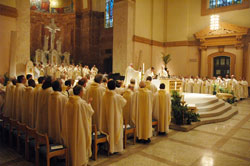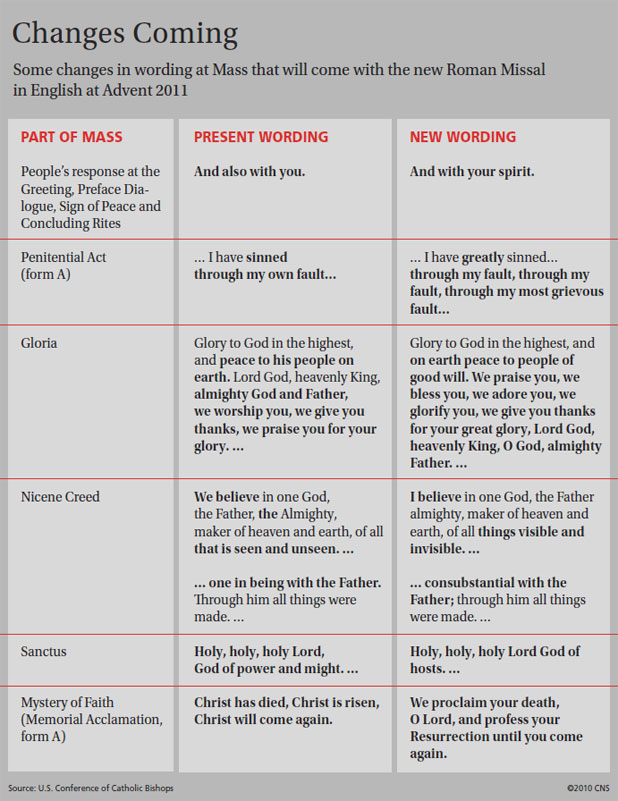Words of worship: Workshops help priests learn about and prepare for new Mass texts

Scores of priests who minister in the Archdiocese of Indianapolis join Archbishop Daniel M. Buechlein in praying the eucharistic prayer during the annual chrism Mass on April 7, 2009, at SS. Peter and Paul Cathedral in Indianapolis. Father Patrick Beidelman, the archdiocesan director of liturgy, is leading a series of workshops to help priests in central and southern Indiana prepare to use the new English translation of the Roman Missal—the texts for the Mass—which will take effect during the weekend of Nov. 26-27, 2011. (File photo by Sean Gallagher)
By Sean Gallagher
When the new English translation of the Roman Missal—the texts for the Mass—is first used on the weekend of Nov. 26-27, 2011, it will be priests who will experience the greatest amount of change.
Many of the prayers that priests have proclaimed, in many cases for 40 years, will be significantly different on that first weekend in Advent in 2011.
At the same time, priests who minister in the archdiocese’s 151 parishes are in a prime position to help the laity prepare for the changes that they will find in the new translation.
The staff members of the archdiocesan Office of Worship have worked hard to organize a series of small-group workshops to help priests with the important task that awaits them. (Related story: New Mass translation has many reasons, provokes hopes and fears)
Father Patrick Beidelman, the archdiocesan director of liturgy, is in the middle of leading 18 workshops in each of the archdiocese’s 11 deaneries.
Most of the workshops last close to eight hours. They include time for priests to share how they learned to celebrate the Mass, an explanation of how and why the new translation came about, and an opportunity to practice praying and chanting some of the new prayer texts.
The workshops are also a time for priests simply to enjoy the company of their brother priests, including sitting down for a meal together.
“We also chose these small-group gatherings to give priests the opportunity to spend some time together,” Father Beidelman said, “and to learn from each other and to be supported by one another in the time that we have together.”
On Sept. 16, a dozen priests, many of whom minister in the Indianapolis North Deanery, gathered in the rectory of St. Simon the Apostle Parish in Indianapolis for a workshop.
Some of these priests spoke with The Criterion during breaks at the meeting and in the days following it.
Father Noah Casey, the pastor of St. Luke the Evangelist Parish in Indianapolis, was pleased with the conversation among his brother priests about how they learned to celebrate the Mass.
“It gave us a chance in a smaller group setting to have some quality sharing and interaction on questions [about liturgy] that we don’t usually have the opportunity to talk about,” he said. “The initial session of sharing was really quite outstanding.”
Many of the priests who came together at St. Simon were ordained in the 1970s. One priest was ordained only two years ago. Retired Father William Munshower was the senior priest present, having been ordained in 1958.
That was six years before the Mass began to be celebrated in English, and many of the rituals were changed.
With that broad array of changes in mind, Father Munshower put the adjustment to the new translation into perspective.
“I don’t anticipate that much change. There will [only] be some linguistic changes,” he said.
Father Michael O’Mara, the pastor of St. Mary Parish in Indianapolis, brought his own point of view to the meeting. For years, he has celebrated Mass in Spanish, and the texts are much closer to the original Latin texts.
When the new English translation begins to be used in a little more than 13 months, it will be closer to the Spanish that he regularly prays. The bilingual priest thinks this will be a help to the Hispanic children and youths in his parish.
“For our younger kids, as they’re learning the Mass in English, maybe it’s going to make more sense to them because they’re bilingual,” Father O’Mara said. “The kids are always the hope for the future.”
Father Casey is hopeful for a different reason. He foresees parishes in the archdiocese doing much more work to prepare their members for the new translation than what happened during and immediately after the Second Vatican Council—the last time that major changes in the Mass occurred.
“In general, we’re taking a much more systematic approach to the catechesis on this than we did [during] the Second Vatican Council,” said Father Casey, who was a high school seminarian during Vatican II. “One week, you came to church and the communion rail was there. And the next [week], you came and it wasn’t, and nobody said anything about it.”
At St. Luke, Father Casey plans to schedule an adult faith formation speaker series next Lent that will focus on the new translation. He also said that bulletin inserts on the Mass and other reading material on liturgy will be distributed to his parishioners during the coming year.
Father William Marks, the pastor of St. Simon Parish, said a similar effort will be undertaken at his parish.
Nevertheless, he realizes that the changes in the Mass texts may be difficult for some of his parishioners.
“How do you make them feel comfortable as soon as possible in their own church?” Father Marks wondered. “I think that’s the challenge that we have. How do we get them to be comfortable with the changes?”
In his comments after the meeting, Father Beidelman said that the discomfort that some archdiocesan Catholics may experience when the new Mass translation is used can be an opportunity to deepen their relationship with Christ because “God doesn’t visit us with gratuitous disorientation.”
“People’s first reactions to this new translation … have fallen and will fall all across the spectrum,” he said. “What we need to do is not let that be something that divides us, but rather makes us pause and truly peer into the gift that we are being given by this opportunity for growing in our understanding of the Mass and of our brothers and sisters in Christ.”
(For more information about the new translation of the texts for the Mass, log on to www.usccb.org/romanmissal or call the archdiocesan Office of Worship at
317-236-1483 or 800-382-9836, ext. 1483.) †


